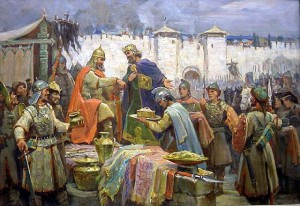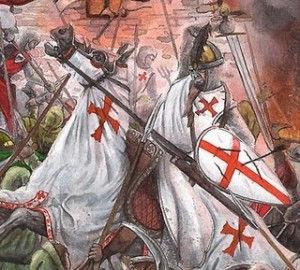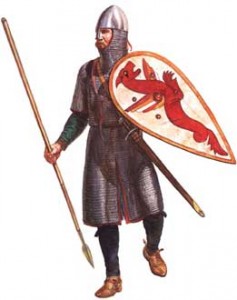 Derrick asks how Justinian II was able to exact tribute from the Caliphate. Though certainly colorful, the great, great grandson of Heraclius was a disastrous emperor. Only 17 when he took the throne, his heavy taxes soon made him unpopular with the rank and file, and his disdain for the Senate alienated the nobility. After a decade he was so despised that a mob in the Hippodrome deposed him, cut off his nose and split his tongue. Somehow he managed to claw his way back from exile (with replacement gold nose in tow), sneak into Constantinople through an unguarded aqueduct and regain his crown. The next six years were spent killing anyone who looked at him sideways until the fed up population overthrew him again- this time cutting off his head to be sure there wasn’t a third reign.
Derrick asks how Justinian II was able to exact tribute from the Caliphate. Though certainly colorful, the great, great grandson of Heraclius was a disastrous emperor. Only 17 when he took the throne, his heavy taxes soon made him unpopular with the rank and file, and his disdain for the Senate alienated the nobility. After a decade he was so despised that a mob in the Hippodrome deposed him, cut off his nose and split his tongue. Somehow he managed to claw his way back from exile (with replacement gold nose in tow), sneak into Constantinople through an unguarded aqueduct and regain his crown. The next six years were spent killing anyone who looked at him sideways until the fed up population overthrew him again- this time cutting off his head to be sure there wasn’t a third reign.
So how did such a dreadful leader manage to exact tribute from the Caliphate? That was largely through the hard work of his father Constantine IV and grandfather Constans II. They had energetically opposed the surging armies of Islam and largely stabilized the eastern provinces of the empire. Constantine IV even forced Caliph Abd al-Malik into signing a peace treaty and started to think about going on the offensive, but he died at age 35 before any serious preparations had been made. Fortunately for the empire the new emperor Justinian II was an unknown quantity and Al-Malik, concerned about revolts within the Caliphate and fearing new Byzantine attacks decided not to risk it. He renewed the treaty, sweetening the pot by agreeing to increase the yearly tribute and share the income from Armenia, Iberia, and Cyprus.
It must have seemed at first as if the Arabs got the better end of the deal. Justinian spent the next five years demonstrating that he had fully inherited his family’s military ability. A campaign against the Slavs restored the Balkans to imperial control and a second one drove the Bulgars out of northern Greece. Turning east, he swept into Armenia and Iberia and the show of strength convinced the Caliph to increase the annual tribute. By now, however, Justinian II had convinced himself he was his famous namesake and was no longer satisfied with tribute. He drafted the defeated Slavs into his army and invaded the Caliphate. The conscripted soldiers took the first opportunity to desert and the outnumbered Byzantines were easily routed. The Arabs seized Armenia and Justinian II returned to Constantinople to find the populace fed up with his overbearing ways and the taxes needed to fight his never-ending wars.
By the time he regained his throne the pain and suffering had unhinged his mind. The international situation had drastically changed during his ten years in exile, but all he cared about was revenge. As the frontiers collapsed around him he descended into a bloody reign of terror. The empire paid the price of his negligence. Only six years after his death an Arab army was at the gates of Constantinople poised to extinguish the empire.
With this record it’s hardly surprising that Justinian II doesn’t fare well with historians. The golden nose and brutal reprisals tend to overshadow any more mundane accomplishments, and he’s almost never given credit for his real abilities. The last descendant of Heraclius may have had lousy judgment, but he was no slouch on the battlefield.
 Justin asks how crippling the Fourth Crusade was for the Byzantine Empire.
Justin asks how crippling the Fourth Crusade was for the Byzantine Empire.
Many historians view it (with good reason) as having destroyed the empire- or at least started it on its final decline. The most obvious impact was economic. During the initial three days of plundering a vast amount of loot was seized- enough for the Crusaders to breathlessly report that they had captured one fourth of all the wealth in the world. The pillaging, however, didn’t stop with the initial assault. For the duration of the Latin kingdom of Constantinople (roughly sixty years) relics and artwork continued to stream out of the city as hidden caches were found and houses, palaces, and churches were stripped bare. The more prestigious articles ended up in the reliquaries of western Europe- many in cathedrals established specifically to accommodate them. (Notre Dame was built to house the head of John the Baptist) The exodus of wealth left Constantinople impoverished and by the end of the occupation, the Latin emperors were reduced to stripping the lead off of the roofs of the imperial palaces.
When Michael VIII recovered the city in 1261 he found it in a sad, dilapidated condition- ‘shrunken like an old man in the clothes of his youth’. Deserted houses were still sagging from the fires that had damaged them more than half a century before, and vast stretches of land were given over to weeds. Even worse than the physical destruction was the psychological damage. The unity of the empire was permanently shattered. Where there had been one Orthodox Empire there were now three successor states- Nicaea, Trebizond, and Epirus- all claiming to be the same thing. Epirus eventually succumbed to the restored power of Constantinople but Trebizond never did. In the view of most Byzantines the relationship with the West- both moral and diplomatic- had been irrevocably sundered. When the final end came, they would famously say ‘better the Sultan’s turban than the Pope’s mitre.’
But despite the tremendous physical and mental impact of the Fourth Crusade, is it really fair to say that it destroyed the Byzantine Empire? In the years leading up to the Crusade Byzantium was decaying from the inside, plagued by foolish leaders, aristocratic greed, and military incompetence. It was a very sick patient by 1204 and its illness went much deeper than a weak army or neglected defenses. It was dying a slow death before the first Crusader showed up, and it lingered on for another 249 years after the sack. Did the Fourth Crusade weaken the empire? Certainly. Did it hasten its demise? Probably. But did it destroy Byzantium? No.
 Monty asks if Great Britain would have become a great nation without the martial input of the Normans.
Monty asks if Great Britain would have become a great nation without the martial input of the Normans.
Of course we can’t know for sure what would have happened if the Normans hadn’t crossed the Channel, but to answer the question briefly I think the answer is ‘no’. Without the Normans I doubt there would even be a Great Britain much less a British Empire. The union of Scotland and England into a new entity called Great Britain came about with the Act of Union in 1707 (Ireland wasn’t officially added until 1801), but despite the late date it was the final act in a play that had begun with William the Conqueror.
The Anglo-Saxons were always more defensively minded than the Normans. Harold and his predecessors had contacts with the neighboring kingdoms- Godwin’s family involved themselves with both Macbeth in Scotland and Diarmait mac Maíl na mBó in Ireland- but never on a large scale. Where they did exert themselves (the Welsh border for example) they settled for a sort of ‘over-king’ recognition. Scotland was more organized and therefore a more difficult conquest, and if one of Harold’s successors had the inclination and ability to pull off an invasion, they most likely would have tried to impose the same kind of recognition. Ireland on the other hand, was probably too much of a stretch even for the most ambitious Anglo-Saxon king. The Irish Sea was notoriously difficult and the English didn’t yet see the value of a fleet. The real obstacle to an Old English empire was the Anglo-Saxon style of fighting. They didn’t have professional armies, and shield walls (as the name implies) are better for fending off an attack than carrying out one.
The Normans by contrast, had both the organization and more importantly the desire to invade. They cut a swath through medieval Europe dominating the stage for over a century and rarely losing a battle. Their heavy cavalry raids were nearly unstoppable- there is no better example than at Cerami in Sicily where 500 Norman knights smashed an army 70 times their size. It was this martial spirit that carried Norman arms into Ireland, Scotland, and Wales, and triumphed at Crécy and Poitiers. The Act of Union- and the British Empire- was the end result of that drive.
One final postscript: I think the Anglo-Saxons generally get short-changed by historians. The heavy cavalry charge that saw the Normans to victory in nearly every battle dramatically failed in two cases. The first was at Hastings- the shield wall/axe-wielding huscarls more than held their own against repeated charges. The English lost because their discipline let them down- they abandoned the higher ground in scattered groups to chase fleeing knights and were butchered out in the open. The second case was exactly fifteen years later near the Albanian city of Dürres. The Varangian Guard- composed largely of Anglo-Saxon refugees met the Norman army of Robert Guiscard. Once again the Norman charge failed and the Anglo-Saxon huscarls inflicted horrendous casualties on the attacking cavalry. Unfortunately for the English, large segments of the imperial army chose that moment to desert and the Varangians were left exposed and surrounded. The result was a second defeat, which effectively obscured what the English had accomplished. They might never have become a great power with a defensive mindset, but the fighting abilities of the Anglo-Saxons stopped the foremost military machine of the 11th century in its tracks. Twice.
 Derrick asks how Justinian II was able to exact tribute from the Caliphate. Though certainly colorful, the great, great grandson of Heraclius was a disastrous emperor. Only 17 when he took the throne, his heavy taxes soon made him unpopular with the rank and file, and his disdain for the Senate alienated the nobility. After a decade he was so despised that a mob in the Hippodrome deposed him, cut off his nose and split his tongue. Somehow he managed to claw his way back from exile (with replacement gold nose in tow), sneak into Constantinople through an unguarded aqueduct and regain his crown. The next six years were spent killing anyone who looked at him sideways until the fed up population overthrew him again- this time cutting off his head to be sure there wasn’t a third reign.
Derrick asks how Justinian II was able to exact tribute from the Caliphate. Though certainly colorful, the great, great grandson of Heraclius was a disastrous emperor. Only 17 when he took the throne, his heavy taxes soon made him unpopular with the rank and file, and his disdain for the Senate alienated the nobility. After a decade he was so despised that a mob in the Hippodrome deposed him, cut off his nose and split his tongue. Somehow he managed to claw his way back from exile (with replacement gold nose in tow), sneak into Constantinople through an unguarded aqueduct and regain his crown. The next six years were spent killing anyone who looked at him sideways until the fed up population overthrew him again- this time cutting off his head to be sure there wasn’t a third reign.
